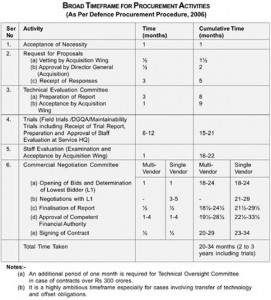Sub-Optimal Quality of Acquisition Staff
Indifferent quality of acquisition staff is the single most important reason for delays in procurements. Officials who perform acquisition functions are drawn from the civil services, defence forces and the defence finance. No one is selected for any special flair for the job. For most of them it is just another routine assignment. Their approach continues to be entrenched in bureaucratic mediocrity and procedural quagmire.
No training in acquisition functions is ever provided to them. They are expected to identify, trial evaluate and negotiate import of defence equipment worth millions of dollars using their commonsense and basic intelligence. It is a very unfair and tall order.
The Services
The services are the biggest defaulters. They pay no attention to the selection of acquisition staff, although all procurement proposals are initiated by them and they are the most affected party. They have qualitative requirements spelt out for a host of other lesser appointments but none whatsoever for functionaries dealing with acquisitions that affect their war potential. Any officer can be posted to these appointments. Such an apathetic approach results in faulty preparation of qualitative requirements, tardy field trials and flawed staff evaluation.
Civil Officials
All expert committees have so far concentrated only on reforms in structures and procedures. No dispassionate, objective and holistic exercise has ever been carried out to identify the underlying reasons for inordinate delays which continue to dog the system.
Civil officials of the Ministry of Defence (MoD) accord approval to procurement proposals, issue Requests for Proposals (RFP), accept technical evaluation to shortlist vendors to be called for field trials, approve staff evaluation, open commercial bids and negotiate contracts with the lowest bidder. As can be seen, their span encompasses almost all procurement activities. Their role is of utmost importance and has a direct bearing on the success of any procurement programme.
They need to handle functions which involve intimate knowledge of military’s functioning, defence equipment, technologies involved and commercial negotiations. However, their selection is done in a routine manner without consideration of any demonstrated flair or proficiency. No training is imparted to them. Additionally, their short tenures preclude acquisition of on-the-job expertise.
Defence Finance
No procurement proposal can fructify unless Defence Finance functionaries concur with it at all stages from acceptance of necessity to closing the deal. Most importantly, they actively participate in all facets of commercial evaluation and negotiation of contract.
Despite the fact that they are mandated to ensure financial propriety, they are ill equipped for the task. They are neither qualified nor trained for defence economic advisory functions. Most of them are unable to grasp intricacies of international trade including application of Discounted Cash Flow and Exchange Rate Variation techniques.
Preparation of faulty contract documents can be directly attributed to their inability to understand implications of various provisions, resulting in nearly all subsequent arbitrations going against India’s interests.
And finally, Defence Finance takes fiscal orders from Ministry of Finance (MoF). Many feel that no major proposal is cleared till they get a green signal from MoF. This is done primarily to keep Central Government’s overall expenditure under control and force MoD to surrender funds to reduce deficit. This amounts to withdrawing funds allocated to MoD for its capital procurements, thereby adversely affecting the planned modernisation schedule.
Procedural Glitches
- Lack of Continuity of Policy. The services have no long term procurement policy. Procurement projections are based on personal preferences of the authorities involved. There is no collegiate decision-making for continuity. Many proposals are aborted midway as the new commanders differ with their predecessors. Frequent changes in priorities and parameters delay acquisitions. Fresh proposals take time to fructify.
Indifferent quality of acquisition staff is the single most important reason for delays in procurements. Officials who perform acquisition functions are drawn from the civil services, defence forces and the defence finance. No one is selected for any special flair for the job.
- Need for Repeated Approvals. Every proposal gets subjected to repeated reviews and approvals. Even after the sanction of the complete package by the competent authority, each individual item has to be got approved separately. Additionally, every proposal entails obtaining ‘Acceptance of Necessity’ and ‘Quantity Vetting’ from different entities. Every approval means months of delays.
- Field Trials. These are carried out to validate performance characteristics in actual ground and climatic conditions, as per the trial directive issued by the service HQ. Trials are time consuming and laborious. Not adequate attention is paid to this most critical activity. Most of the trial team leaders view them as superfluous assignments. Further, there is a tendency amongst trial teams to couch their recommendations in imprecise and unspecific language. Many trial team leaders and intermediate commanders tend to introduce new parameters as per their visualisation. Such recommendations either force repeat trials or even ‘kill’ the case.
- Determination of Lowest Bidder. Determination of the lowest bidder is a highly unscientific and long drawn process as there is no standard matrix against which the commercial proposals can be evaluated, more so when transfer of technology is included in the package. Prolonged discussions are carried out to clarify various issues to bring all bidders to a common comparable level.
- Commercial Negotiations. Maximum delay takes place at the price negotiation stage. First, there is no standard procedure in place to determine fair price of the equipment being purchased. Every one gropes in the dark and goes more by gut feeling than by any scientific calculation. Secondly, there is no integral legal advice available to the price negotiation committee to go through the fine print of the draft contracts. Most importantly, all commercial negotiations are carried out closer to the end of the financial year with the result that the officials involved are rushed for time to finalise the deals.





